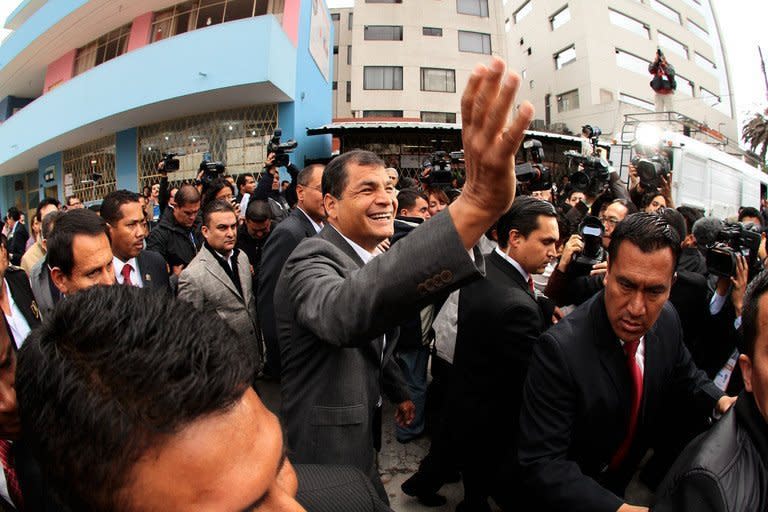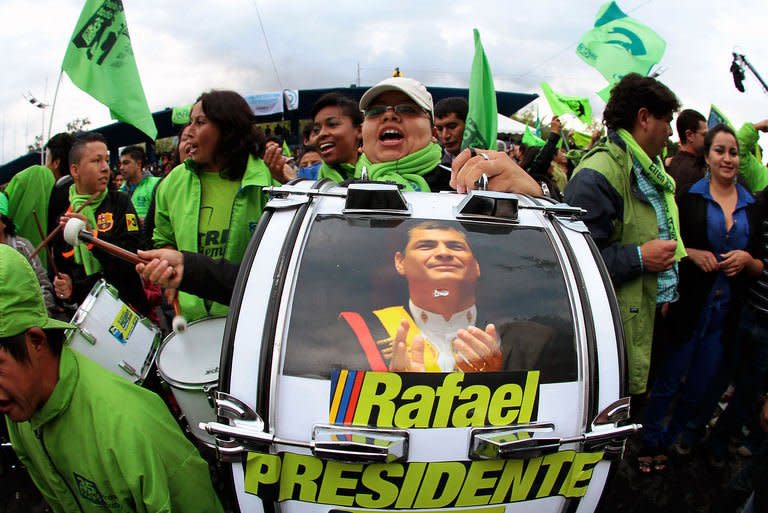Ecuador's Correa declares victory in presidential poll
President Rafael Correa declared victory in the first-round of Ecuador's presidential vote Sunday as he celebrated with thousands of supporters in the South American country's Andean capital. "Nobody is going to stop this revolution; we are making history," Correa said, echoing the rhetoric of his socialist ally Venezuelan President Hugo Chavez. "We are here to serve you," Correa told a crowd from the balcony of the presidential palace in Quito. "Nothing for us, everything for you: the people who deserve the right to be free." His announcement came shortly after polls closed in an election he had been widely expected to win. Exit polls gave him about 60 percent of the vote -- and a roughly 40-point lead over his nearest rival, banker Guillermo Lasso. To avoid a second round, Correa needed to win either 50 percent of the valid vote or 40 percent with a 10 point lead over the nearest contender. When casting his ballot in a Quito school earlier in the day, the 49-year-old leftist economist urged Ecuador's 11.7 million registered voters to turn out in large numbers to "elect our future." "In our hands is our destiny," said Correa, who has been in power since 2007 and is one of a wave of leftist leaders shaping recent Latin American politics. At stake besides the presidency are the country's vice presidency and 137 seats in the unicameral legislature. As citizens headed to the polls, international observers from UNASUR, a grouping of Latin American countries, reported the process was proceeding normally, although delays were noted at some voting stations. "I voted for the president because the others only make passing promises and then do not keep them," said Mariano Chicaiza, a 68-year-old farmer in Cangahua, an isolated indigenous community in the mountains northeast of Quito. Lasso, a finance minister during an economic crisis in the 1990s, who got around 20 percent backing in the exit polls, voted in big-city Guayaquil, he said, "with great faith that the Ecuadoran people will know to make a better decision." About 30 percent of Ecuador's 15 million people live below the poverty line, and Correa popular social programs have won him support across the geographically diverse nation, from the Galapagos islands to the sweltering Pacific coast, up the towering Andes and down to Amazon basin lowlands beyond. A self-declared foe of neo-liberal economics, he has also taken on big business and media groups, imposing new contracts on oil companies and renegotiating the country's debt while touting his poverty reduction efforts. After clashing with privately-owned media, which he accuses of backing a police revolt in 2010, Correa barred his ministers from talking with opposition newspapers. And while he presents himself as a "defender of freedom of expression," Correa wants to enact a new media regulation law. Last year, Correa irritated Britain and the United States by granting asylum to WikiLeaks founder Julian Assange -- who is wanted for questioning in Sweden over sexual assault allegations -- at Ecuador's embassy in London. Critics accuse Correa of scaring away foreign capital, pointing to his friendships with the leaders of Cuba and Venezuela, though the Ecuadoran president has been more pragmatic than his leftist allies. Ahead of the vote, Correa's Alianza Pais party held the largest bloc of seats in the Congress, but Correa told supporters on Thursday that he needs an absolute majority to deepen his "socialist revolution." Correa has brought a measure of political stability to Ecuador, which had seven presidents in the turbulent decade that preceded him, including three who were overthrown. Voting is mandatory for people age 18 to 65, and optional for youths 16 years and older as well as for people over 65.




